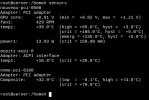Hello,
I'm trying to get a reading of my cpu temperature but nothing seems to work really in Proxmox. My hardware is as follows:
- Ryzen 9 5950X
- Gigabyte Auorus B550M Pro-p
I have updated everything to the newest state with:
Then i tried to get a reading with:

But nothing shows upp for the CPU. The next step was to upgrade the kernel to the newest version by first adding the following repository:
Followed by:
This did not help either (It did fix the missing LAN-drivers for the motherboard though for others that have the same issue).
I also tried to use zenpower (https://github.com/ocerman/zenpower) but this does not solve the problem either.
Most workarounds seem to only focus on Asus motherboards and their particular drivers.
Anyone who know's how I can get a temperature reading om my ryzen 5000-series CPU?
I'm trying to get a reading of my cpu temperature but nothing seems to work really in Proxmox. My hardware is as follows:
- Ryzen 9 5950X
- Gigabyte Auorus B550M Pro-p
I have updated everything to the newest state with:
Code:
apt update
apt dist-upgrade
apt autoremoveThen i tried to get a reading with:
Code:
apt install lm-sensors hddtemp
sensors-detect
But nothing shows upp for the CPU. The next step was to upgrade the kernel to the newest version by first adding the following repository:
Code:
deb http://download.proxmox.com/debian/pve buster pve-no-subscription
Code:
apt install pve-kernel-5.11
apt install pve-headers-$(uname -r)
update-grub
rebootThis did not help either (It did fix the missing LAN-drivers for the motherboard though for others that have the same issue).
I also tried to use zenpower (https://github.com/ocerman/zenpower) but this does not solve the problem either.
Most workarounds seem to only focus on Asus motherboards and their particular drivers.
Anyone who know's how I can get a temperature reading om my ryzen 5000-series CPU?

